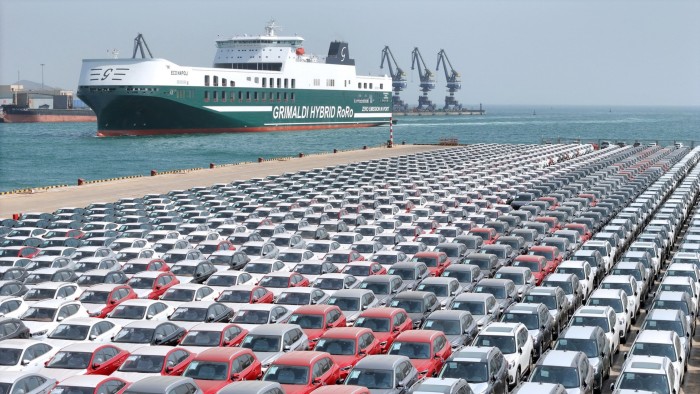Stay informed with free updates
Simply sign up to the Chinese trade myFT Digest — delivered directly to your inbox.
China was targeted by a record number of trade disputes at the World Trade Organization last year as the country’s booming exports swamped international markets and triggered objections from its trading partners.
Beijing was the subject of 198 trade investigation cases at the WTO in 2024, double its tally the previous year and accounting for nearly half of all disputes lodged at the global trade body, according to research by Peking University economics professor Lu Feng.
Chinese policymakers have relied on a surge in exports to sustain growth in the world’s second-biggest economy and offset weak domestic demand amid a years-long property sector slowdown. The country’s global trade surplus reached a record of near $1tn in 2024.
“If China’s economy can become more balanced for her own interests, it may also improve relations with other countries,” said Lu.
Analysts said US President Donald Trump’s tariff pressure on China would exacerbate trade pressures elsewhere, especially in developed countries, as targeted Chinese goods would flow into other markets.
Trump has imposed additional levies of 20 per cent on all Chinese goods since taking office in January, and is expected to unveil reciprocal tariffs against US trade partners on April 2. Beijing has retaliated by targeting about $36bn of US goods including agricultural products, cars and energy.
“The more barriers the US and Japan put up, the more the EU has to digest of Chinese excess production,” said François Chimits, an economist at the Mercator Institute for China Studies.
The European Commission launched 21 trade investigations into Chinese products in 2024 — including steel cylinders, plywood, candles and decorative paper, among others — up from nine the previous year, according to Chinese data.
More than half of the trade cases against China last year were initiated by developing countries, indicating that western countries’ objections to Chinese overproduction were widely shared.
The data showed 117 cases were initiated by emerging economies, including 37 from India, 19 by Brazil and nine from Turkey.
The flood of low-cost output from China has even unnerved some of Beijing’s closest partners. Russia recently imposed “recycling fees” to impede booming Chinese car imports, which have taken up almost two-thirds of the local market in the wake of western sanctions on Moscow.
Pakistan, to which China is the largest sovereign donor, opened five trade cases in 2024 focused on rising imports of printing paper, self-adhesive tape and chemical products.
Pakistan’s finance minister Muhammad Aurangzeb told the Financial Times that the countries’ relationship “goes well beyond trade” and the disputes would be resolved in due course.
He added that China was helping to build up special economics zones “so we can actually get the exports going out of Pakistan”, though many Chinese-funded megaprojects in the country have been beset by delays and cost overruns.
Chimits said Chinese leader Xi Jinping’s focus on expanding high-tech industrial capacity raised a longer-term challenge for the country’s trading partners.
“When you’re as big as China, you have to care what your imbalances mean for the rest of the world,” he said.
Chinese policymakers have in recent months pledged to help stimulate consumer spending, but the plans have lacked detail, said analysts.
Peng Sen, a former top official at China’s state planner, said a significant rethink was needed to push the country towards consumption-led growth.
“For a long time, we have prioritised production over living and emphasised investment over consumption,” Peng said at a government forum in Hainan last week.
“Our traditional policies and systems have not been very friendly to consumption, resulting in a state of suppressed consumption.”
Data visualisation by Haohsiang Ko in Hong Kong
Source link









